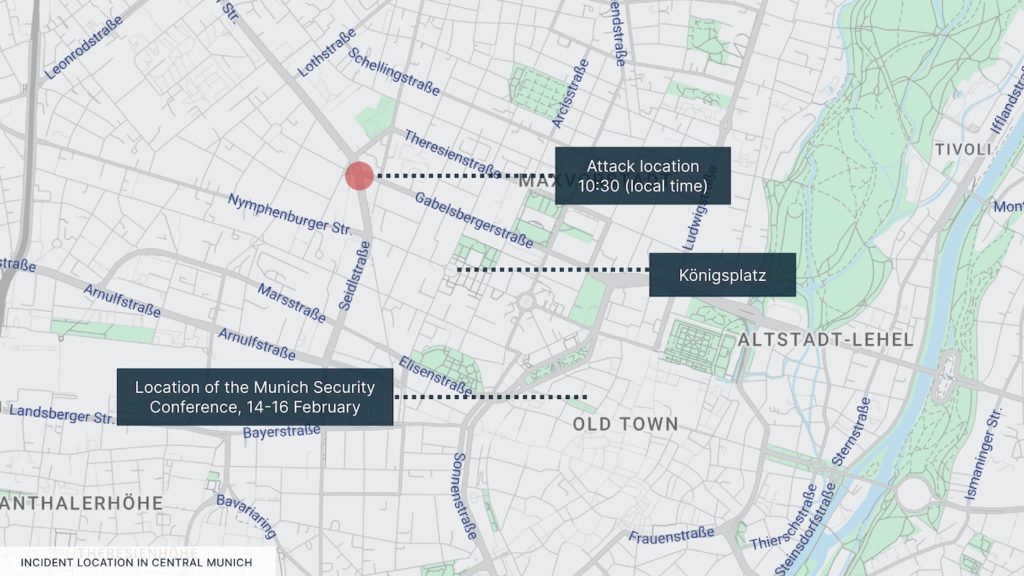Alert+
Car-Ramming in Central Munich: What We Know So Far
Intelligence cut off: 14:00 GMT 13 February 2025
At approximately 10:30 (local time), a car ramming occurred in the centre of the Bavarian city of Munich, at the intersection of Dachauer Strasse and Seidlstrasse.
According to witnesses, an individual drove a vehicle into a crowd of members of the Verdi labour union, who had gathered for a rally in the Königsplatz area. Other witnesses reportedly stated they heard some gunshots, but these testimonies could not be corroborated by authorities at the time of writing.
At least 28 people were injured in the attack, with “several” in critical condition. No deaths have been reported as of the time of writing.
The police arrested the perpetrator on the scene. According to local German media, the suspect is a 24-year-old Afghan national, who was known to local police for previous non-terror-related offences. Available information suggests that the perpetrator of the attack acted alone.
While the police blocked traffic in the area immediately adjacent to the site of the ramming, no reports of widespread traffic closures or disruptions were identified as of the time of writing. The Munich Security Conference, which will be attended by numerous world leaders and high-profile figures, is scheduled to be held in the centre of the city between 14 and 16 February

INTELLIGENCE ANALYSIS
Car-Ramming in Munich: Possible Terror Links and Election Impact
It is highly likely that the incident was terror-related. Its dynamics share considerable similarities with other cases of “lone wolf” terrorism recently recorded in Europe and North America.
The attack happened in a busy, high-visibility part of central Munich, and used an unsophisticated and easily accessible weapon.
Moreover, notable car-ramming attacks have occurred in Germany in the past, attaining extremely high visibility and likely inspiring copycats. These include a 2016 attack in Berlin, which killed 13 and injured 56, and the more recent attack in Magdeburg, on 20 December 2024, which killed 6 and resulted in hundreds of injuries.
The timing of the attack is likely linked to the upcoming German election, scheduled to occur in less than two weeks, and may have been meant to attain maximum visibility and possibly provoke further copycat actions.
The attack is almost certain to further increase the already high tensions surrounding the upcoming German elections, where the far-right Alternative for Germany (AfD) is highly likely to register its best-ever result.
Considering the impacts of past cases of terrorism in Germany, it is highly likely that the attack in Munich will spark large-scale protests (and counterprotests), particularly in Bavaria. These, in turn, are likely to be desirable targets both for possible copycats and, possibly, for “retaliatory” violence.
The election campaign and voting process in Germany are likely to face an elevated terrorism threat, particularly in large and medium-sized urban areas, during their final days.
Travel Risk Advice: Safety Guidelines for Munich, Germany
- In Munich, abide by authority directions, avoid all gatherings and the area of Königsplatz, and plan for alternative routes.
- Closely monitor local news reports and government alerts.
- If in the event you become caught in the vicinity of an attack you are reminded to RUN – HIDE – TELL.
- If caught in the vicinity of an attack, seek immediate hard cover and leave the area if safe to do so. Continue to adhere to all instructions issued by authorities and obey any security cordons in place.
- Further attacks cannot be ruled out. Remain vigilant over the coming days and avoid large gatherings, public buildings, transport hubs and military infrastructure where possible.
- Expect and plan for significant security deployments and disruptions in Munich and other German cities before and during the elections.
- Avoid all large gatherings as a precaution, as these may be targeted by copycat attackers.
- Ensure that you always carry personal identification documents or copies.
- Have emergency contact numbers saved on your phone. These should include the local authorities, medical facilities and any consular support. Ensure that mobile phones are charged in case of any losses in electricity.
- Monitor the Solace Secure platform and trusted local media for updates relevant to the conflict.
- The emergency number in Germany is 112.

